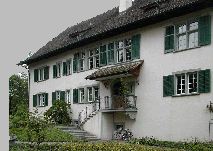What are the Qualifications of a Jungian Analyst?
Certification as a Jungian analyst requires completion of a thorough post-graduate training program at an institute approved by the International Association for Analytical Psychology.
A Jungian analyst's training extends from four to eight years in addition to a graduate degree.
Requirements for admission to a Jungian training program include a graduate degree or the equivalent, supervised clinical experience, extensive personal Jungian analysis, submission of an autobiographical statement, and several interviews with a selection committee.
As training candidates, students at the C. G. Jung Institute in Zurich attend lectures and seminars on a wide range of analytical topics. Then, after submission and acceptance of several papers, they take examinations on fundamentals of Jungian analysis, psychoanalysis, theories of neurosis, dream analysis, comparative religion, and analysis of myths and fairy tales – the propadeuticum.
After a minimum of two years of training, completion of the propadeuticum examinations, and a second series of interviews, they are promoted to diploma candidate status and enter the clinical phase of the training. They are then permitted to accept clients for Jungian analysis under supervision by a senior analyst approved by the Institute
The final phase of the training includes extensive case supervision, a second series of papers and examinations, and a written thesis.
